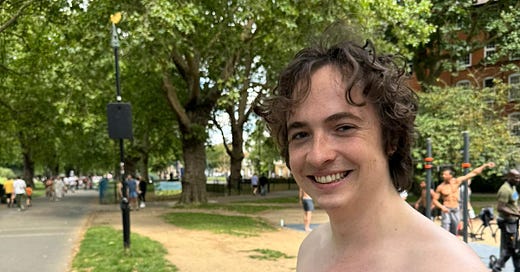“Whatever in creation exists without my knowledge exists without my consent” says creepy Judge Holden in Blood Meridian. “Whatever plays in London without my free ticket exists without my consent” is how I’d tailor that.
An adaptation of Never Let Me Go will play at the Rose Theatre in Kingston from the 20th of September to the 12th of October. There are plenty of tickets, and they’re not expensive, but on the 25th, labelled ‘Press Night’, all the seats are greyed out, unavailable to me. Today we assault that bleak indifference.
First though, while we’re at desires – I want Chappell Roan to give me an interview when she comes to London on September 20th, I want an early copy for review of Sally Rooney’s next book that comes out on September 24th, and I want an early copy for review of Boris Johnson’s memoir that comes out on October 13th.
To better my odds I’ll publish my Rooney in two weeks. Also, Faber and Faber’s office is like five doors down from ours on Hatton Garden, so I can also spend a few lunch breaks standing outside smiling inanely through the window, in case that helps. I have no comparably infallible strategies for Roan or Johnson.
But another fun week of friends each night, and not to the detriment of output. I think action helps that, and you want to drink it all in anyway don’t you. It’s Friday for me here. A wide weekend before me in which I shall take my pleasures: the library, the park, reading and writing, some exercise, and my new massage gun. I just hope that Hackney Central Library is a good one and that I fare ok at the page.
On Monday I attempted an overnight NS political piece on the riots, but couldn’t quite get it good enough. Me and a friend were sent to Walthamstow on Wednesday though. We didn’t see any real violence but you might like his write up at the bottom of this week’s Saturday Read.
“Get to the point,” you cry. Do you cry that? I always like the bits where people let you into their lives in these sorts of things. But anyway. Reset now, deep cleansing breaths, the below misty Fenlands, and Ishiguro…
“She didn’t shriek”: Kazuo Ishiguro’s Never Let Me Go
The students in Never Let Me Go each have a counterpart, from whom they were cloned, living normal lives in the outside world. When Ruth’s ‘possible’ is spotted in Norfolk they travel to see her. The episode receives a full telling, and when the students see and follow the possible, they realise she is not Ruth’s counterpart.
Ready drama is passed up in this way throughout the book. The rumour that students in love may be granted longer lives turns out to be only a rumour. The donor institution is never challenged or enforced. The truth about their futures, which could be concealed or revealed so terrifyingly, is more or less just known. Most tellingly, the schools are generally horrible, but we are shown a rare benign one.
As a proper science experiment alters only the studied variable so that all results are known to be its consequence, our response to the story is our reaction only to people being reared for organ donation. Because we sense that Ishiguro has refrained from gratuitous emotions, we trust those that do come.
I submit that the reading mind’s fancy, passing through these anti-dramatic choices, undergoes the following moods. Initially it flies keenly ahead to each likely drama. Expectation is piqued at the first let downs, but disheartened after they keep coming. Eventually fancy resigns, and the rest of the book is read silently.
Now I submit that this is exactly the interior condition of the characters. Their weird isolation first means they have all sorts of uninhibited ideas, but the continued failure of any of the ideas to materialise leads them to stop thinking and feeling at all. You notice this especially in the late chapters where Kathie and Tommy get together.
Our emotional state is brought to theirs. Presentation and plot align. The book’s power is more than doubled for this. It is a sly and very artful mimesis.
It’s worth remembering – always, I think – that ‘sad’ comes from ‘sated’. At the story’s end the characters are bereft of all appetite. They’re dreamless, bored, and empty. Inanticipative, incapacitated, they want nothing, and nothing is sadder than that.
Of course Ishiguro is possessed of a very fine sensibility, particularly for memory and mood, and most of the classic novelistic virtues are out in force, but his restraint is a major factor. It has a two-part effect of purity and force. It’s like a good tennis toss, that gets the ball into open air and loads the retractive muscles, for a clean and powerful hit.
This is a very wonderful book of a haunting, misty beauty. It is as if you were in Norfolk’s flat Fens and suddenly felt the awe of mountains. It’s sort of at once unbelievable and unmistakeable.
“She didn’t shriek, or even let out a gasp. But we were all so keenly tuned in to picking up her response, and that’s probably why it had such an effect on us.”
GM





